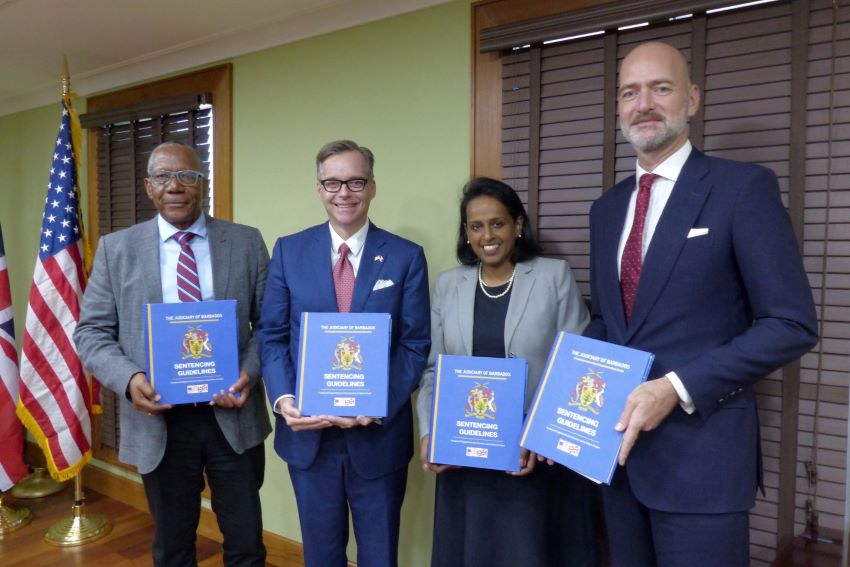
On Friday, May 10, 2024, the Barbados Supreme Court unveiled its inaugural Sentencing Guidelines, marking a significant milestone in the multi-year Barbados Sentencing Guidelines initiative.
Supported by the U.S. and UK Governments through the U.S.-UK Criminal Justice Reform Project, the Sentencing Guidelines introduce a step-by-step process that will help ensure consistency in the approach taken by judges and magistrates when sentencing offenders.
The guidelines will also assist in providing clearer reasons for the sentences passed which can be readily understood by offenders, victims, and the wider public. The first set of guidelines, which deal with rape, drug offences, theft, robbery, burglary, aggravated burglary, and causing death by dangerous driving, are set to come into effect soon. More Guidelines are slated to be developed and implemented in the future in other areas, including firearm offences.
The guidelines were developed by the Sentencing Guidelines Committee, led by Chief Justice of Barbados, The Honourable Sir Patterson Cheltenham and comprising judicial officers, attorneys-at-law from the Office of the Director of Public Prosecutions as well as the private bar, and academics. The Committee’s work was also informed by views received from the public consultation process.
Additionally, a training workshop was held to expose judges, magistrates, prosecutors, and defence attorneys to the guidelines and how they are intended to work.
With the launch of these Sentencing Guidelines, Barbados joins the wider regional sentencing guidelines initiative supported by the U.S.-UK Criminal Justice Reform Project, which has to date produced 22 guidelines for the nine countries that fall under the Eastern Caribbean Supreme Court.
Chief Justice Cheltenham, in his remarks at the launch, emphasised that the Barbados Sentencing Guidelines will in no way restrict judges or magistrates from exercising their discretion when they are determining an appropriate sentence for an offender.
Instead, he explained that the purpose is to provide a framework that guides the approach that a judge or magistrate takes in coming to a sentence in each case, which reflects the crime and its seriousness, as well as the circumstances of the offender and other relevant considerations.
U.S. Ambassador to Barbados, the Eastern Caribbean and the OECS, Roger Nyhus, highlighted the U.S.’ commitment to “best practices in the delivery of justice” and the very real difference being made through the existing partnership between the U.S. Government and Barbados.
He also commended the combined efforts of the judiciary of Barbados and Criminal Justice Adviser to Barbados and the Eastern Caribbean, Sirah Abraham, who leads the U.S.-UK Criminal Justice Reform Project, in bringing this critical initiative to fruition.
Ambassador Nyhus also stated that “the United States is proud to partner with Barbados to strengthen our institutions for the benefit of all our citizens”.
British High Commissioner to Barbados and the Eastern Caribbean, Scott Furssedonn-Wood, in addressing the gathering, lauded the judiciary’s commitment to enhancing the administration of justice and engaging in initiatives that result in meaningful reform within the criminal justice system.
He commended the development of the guidelines, which will enhance public trust and confidence in the criminal justice system and also serve to increase transparency and public knowledge about how sentences are arrived at.
High Commissioner Furssedonn-Wood pledged the UK’s continued support to the Barbados Sentencing Guidelines Project reiterating the UK Government’s commitment to supporting Barbados’ vision for stronger, more just, and inclusive institutions and a bright future.
Both the U.S. Ambassador and the British High Commissioner extended congratulations to Chief Justice Cheltenham on his distinguished career and offered best wishes as he prepares to retire.
